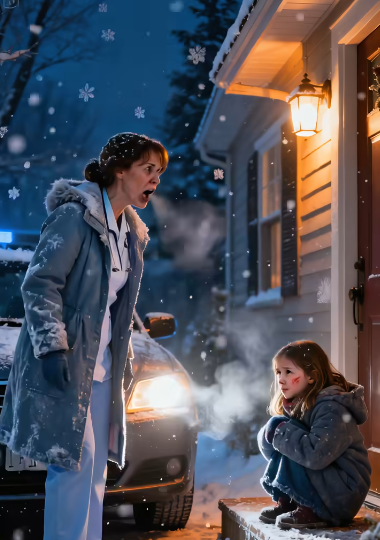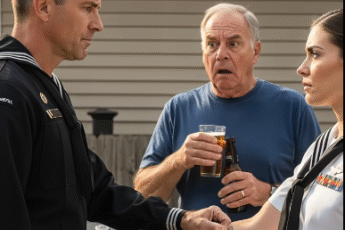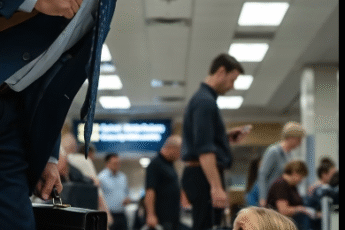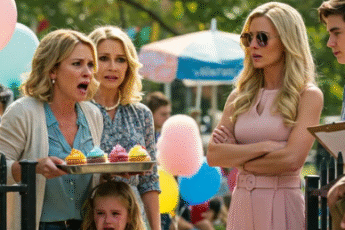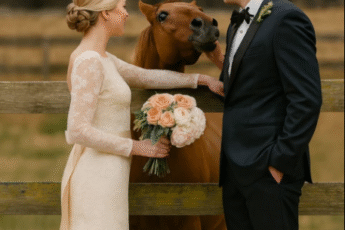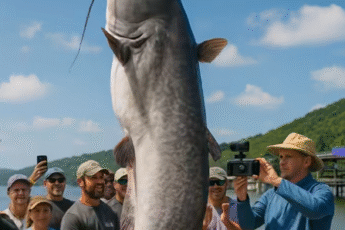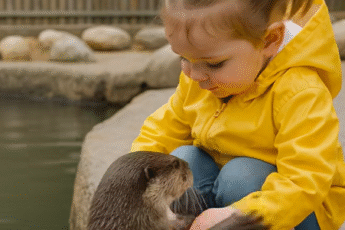It was supposed to be a normal Christmas. Twelve hours of overtime, too much coffee, and the usual mix of glitter and germs that defined December in a children’s hospital. I was running on muscle memory and the sterile glow of hospital lighting when the shift finally ended. The only thing keeping me upright was the picture in my head: driving to my parents’ house, seeing my daughter Alice at the table, dessert still on her plate, the sound of tearing wrapping paper, family chaos—but the kind I could leave at the end of the night.
The parking lot was a sheet of half-frozen asphalt when I left the hospital. I told myself I’d survived the hardest part of the day. I had no idea.
By the time I reached their street, the snow had started again, thick and heavy. The house glowed through the storm, too perfect, too quiet. I walked in expecting noise, hugs, the smell of leftovers. Instead, I got a stage set. The table was cleared, glasses half-full, my mother stacking plates like a closing waitress. My sister, Vanessa, leaned on the counter, scrolling through her phone.
“Where’s Alice?” I asked.
They exchanged that look—half a second, full of meaning.
“Oh,” Vanessa said, not looking up. “She went home.”
I blinked. “Home?”
My mother didn’t look up from her plates. “We all decided she should leave. She needed a lesson.”
For a moment, I thought I’d misheard. Then the words hit me, cold and solid. “You sent her out? Alone?”
“She knows the way,” Vanessa said, still focused on her phone. “It’s not far.”
“It’s dark,” I said, my voice dangerously low. “She’s seven.”
“She’ll be fine.” My mother’s tone suggested I was the problem, not the weather or the fact that my seven-year-old was missing.
Something in me went weightless. The part of my brain that used to argue, to plead, to try and make them understand, shut down. The part that drives just kept going. The car felt too small for the amount of panic inside it. Every streetlight looked the same, every snow-covered sidewalk empty. Halfway home, I tried to bargain with reality. Maybe they exaggerated. Maybe someone walked her back. Maybe she’s already inside, asleep on the couch, and I’m overreacting.
But when I turned the corner, the building was dark. And there she was.
Alice stood by the door, small and still, her breath clouding in the frigid air. When she saw my car, she didn’t run. She just whispered, her voice a tiny puff of white, “You were at work.”
I got out before the car stopped moving. “You’re safe now,” I said, though I wasn’t sure which of us needed to hear it more.
Inside, I wrapped her in a blanket. Her fingers were pink and stiff. “Tell me what happened.”
Her voice was tiny. “Aunt Vanessa said I was bad. Everyone was mad. They told me to go home.”
“Why?”
She hesitated. “Because I wouldn’t let Ethan play with my new toy. He breaks things.” A pause. “They said I wasn’t part of the family if I couldn’t share. I cried and… they told me to go.”
That was enough. I brushed her hair aside. A faint, angry mark shadowed her cheek. “You did nothing wrong,” I said, my voice fierce. She nodded but didn’t believe it.
“I’m sorry,” she whispered.
“For what?”
“For ruining Christmas.”
That nearly broke me. “You didn’t ruin anything,” I said, my voice thick. “They did.”
She was asleep within minutes, still holding the edge of the blanket like it might disappear. I sat there in the quiet, the hum of the heater the only sound. Every conversation from that house replayed itself in my head until the words lost shape. Then I picked up my phone.
Vanessa answered on the second ring, her voice smooth as wine. “Hey, you found her.”
“What exactly happened tonight?”
A sigh. “She was out of control. I disciplined her. She’ll survive.”
“Disciplined?”
“Don’t start, Carolyn. You spoil that kid. She was ruining dinner.”
I let the silence stretch until she filled it. “You’re making that face,” she said. “The judgy one.”
I ended the call. Later, I checked on Alice again. She was warm now, cheeks soft, breathing steady. The faint shadow on her face caught the lamplight, and something inside me went absolutely still. They called it discipline. They called it love. Whatever it was, it ended tonight.
I didn’t shout. I didn’t cry. But while they slept off their wine and righteousness, I started making plans. Three hours later, their lives started to unravel.
People don’t turn cruel overnight. I should have known. I grew up with it. I used to think my family was just strict. That’s what Mom called it whenever someone cried at the dinner table. Strict, not mean. Discipline, not anger. She had a gift for rebranding pain. If we dropped something, strict. If we forgot something, strict. If we breathed wrong, strict. Dad never said much. He’d sit in his chair, reading about baseball or pretending to. Mom handled the “education.”
When I was little, it wasn’t just me. Vanessa got it, too, until she figured out the system. One day, she realized that if she smiled right and said “yes, ma’am” at the right time, the lightning moved. After that, it was mostly me who got struck. By middle school, Vanessa had learned to weaponize it. If something broke, she’d cry first. If something spilled, she’d whisper my name like a prayer.
I spent the rest of my childhood looking for exits. Books were the first one. Science was the second. I liked that in science, cause and effect actually made sense. When other kids wanted to be singers or astronauts, I wanted to be a pediatrician. The first time I told my family, they laughed so hard my dad choked on his coffee. Mom said, “Sweetheart, you’d faint at the sight of blood.” Vanessa said, “You’re not exactly med school material, Carolyn.” I was twelve.
So, I did what spiteful children do. I studied like revenge was an academic subject. Every ‘A’ I brought home was an argument they couldn’t yell over. When I got into medical school, Dad said, “Let’s see if you can make it through.” When I graduated, he said, “You missed your sister’s baby shower.” Nothing I did ever bought peace, just quieter criticism.
I married young, too young, and it didn’t last. He left when Alice was five, said he “wasn’t built for constant stress.” Mom said, “Maybe if you weren’t so opinionated, he’d have stayed.” Vanessa said, “Well, at least you’ll have more time for your patients.”
Still, I kept calling. Holidays, birthdays, the usual guilt traps. I told myself family was family. And when my career started paying off, the guilt turned financial. Vanessa’s kids, Ethan and Cora, were in every expensive activity imaginable. He played at a private soccer academy; she took ballet from a retired prima ballerina. Vanessa couldn’t afford either. I could. So, I paid. Every month. Quietly. Then there was Mom. Her “treatment” for joint pain involved palm trees and mineral water at a “wellness retreat”—rich person language for a vacation with doctor’s notes. I told myself she deserved it.
That’s the thing about growing up in a family like mine. You start thinking generosity is the rent you pay for existing. I thought it kept the peace, kept them nice to Alice. They’d invite her over, send pictures of her baking with Cora, playing with Ethan, smiling like she belonged there. I didn’t realize I was sending her into the same storm, just with prettier decorations.
The next morning, the house smelled like coffee and resolve. Alice sat at the table in her pajamas, tracing circles on the mug I’d given her. The bruise on her cheek had faded, but the look in her eyes hadn’t. She was quiet, careful. Kids learn silence fast when the world teaches it loud.
“Hey,” I said, pouring another cup. “You know what we’re going to do today?”
She shook her head.
“We’re going to talk to someone about what happened.”
Her eyes widened. “Like who? The police?” She froze. “Am I in trouble?”
“No,” I said, my voice gentle but firm. “You didn’t do anything wrong. We’re doing this because people should answer for what they do.” I tried to sound casual. “Also,” I added, “you get to see what real adults look like when they actually listen.” She gave a tiny laugh. That was the first win of the day.
The precinct was mostly empty, a holiday hangover. The fluorescent lights hummed. A young officer looked up when we came in. “Can I help you?”
I introduced myself and explained what happened. I kept my voice even, factual, like I was presenting a case. I didn’t want pity. I wanted a record.
He nodded, typing fast. “Who was the person who struck her?”
“My sister.”
He blinked. “Your sister?”
“Yeah,” I said. “It’s a family thing.”
He hesitated, then looked at Alice. “You’re very brave to come in, sweetheart.” Alice’s shoulders stiffened at “sweetheart,” but she nodded. Progress. He asked her a few gentle questions. She answered each one quietly but clearly. When it was over, he said they’d make a report and possibly follow up. I thanked him, even though we both knew “possibly” meant “maybe never.”
But that wasn’t the point. The point was the look on Alice’s face when we walked out. She stood taller. Her breathing was steady.
Outside, she said, “You weren’t mad at me at all.”
“Why would I be mad?”
“Because I made you go there.”
“You didn’t make me,” I said, kneeling down to look her in the eye. “I wanted to. You deserve to know that when someone hurts you, there’s a way to say it out loud.”
She thought about it. “So, they’re in trouble now?”
“Eventually,” I said. “Trouble has a slow engine, but it always shows up.”
That night, after she went to bed, I sat down at my laptop and opened my bank app. The numbers blinked up at me. Transfers, payments, donations disguised as family loyalty. My cursor hovered over the first one: Vanessa’s automatic payment to the soccer academy. I clicked ‘cancel.’ Next was Cora’s ballet school. ‘Cancel.’ Then my mother’s monthly “wellness treatment.” ‘Cancel.’ Each click felt like reclaiming oxygen. For the first time in years, the money in my account actually belonged to me. It wasn’t revenge, not really. It was accounting, emotional and financial.
Two days later, the phone rang. Vanessa. “Hey,” she said, pretending not to sound frantic. “The payment for Ethan’s program didn’t go through. Can you check your bank?”
I smiled, though she couldn’t see it. “No need. I cancelled it.”
“You what?”
“I’m not paying for you anymore.”
“You can’t just do that! They’ll drop him from the team!”
“Then pay it yourself.”
“Carolyn, this is ridiculous! You’re making a child suffer because you’re mad at me!”
“You’re right,” I said. “I’m mad at you. But that’s not why I stopped paying. I just finally learned not to give my stuff to people who hit my kid.”
“You’re teaching Alice to be selfish,” she snapped.
“Maybe,” I said. “Or maybe I’m teaching her that ‘no’ means ‘no’.” I hung up.
The next day, it was Mom. “What is this nonsense about you cancelling payments? Do you know how humiliating this is for your sister?”
“I’m sure she’ll survive.”
“What about my treatments?” her voice rose.
“That’s not a treatment, Mom. It’s a vacation. If you want a tan, pay for it yourself.”
“Carolyn!” she hissed. “How dare you! After everything I’ve done for you!”
“You mean raising me? Yes,” I smiled to myself. “Maybe that’s the problem.”
There was a sound like static, rage breathing through the phone. Then, “Ungrateful child! You’ll regret this!” Click.
I didn’t. For years, I’d paid for quiet. Turns out, silence was free.
The quiet came first. No phone calls, no messages, no guilt trips disguised as family emergencies. For the first time in years, I woke up and didn’t owe anyone anything. I thought it was over. But I was wrong. The worst was still coming.
The envelope was sitting in my mailbox three days later. Large, official, the kind of beige that means bad news. State Medical Board. I carried it upstairs like it was ticking. Inside, a complaint. Words that didn’t belong to me were twisted into new shapes. Abuse. Instability. Unfit to work with children. And at the bottom, the signatures: my mother, Vanessa.
For a moment, I just stared. Then I laughed, one of those thin, breath-through-your-teeth laughs that sound like crying with better posture. They hadn’t just come for me; they’d come for the one thing I’d built that they couldn’t touch. They’d spent my childhood saying I’d never be a doctor. Now they were trying to make it true.
Alice wandered in, holding her sketchbook. “Mom? Why do you look weird?”
“Because your grandmother and your aunt just accused me of being a danger to children.”
Her eyes widened. “But you’re a children’s doctor.”
“Exactly.”
She frowned, thinking hard. “Are they gonna win?”
I smiled at her. “No. But they’re gonna try.”
I called my lawyer, Michael Adler, that night. “These things happen,” he said, too calm for my liking. “The board will review it. We’ll respond with evidence. You have that police report from Christmas, right?”
“Oh, I have a collection,” I said. “Police report, bank statements, text messages, and enough history to fill a documentary.”
He chuckled. “Then we’re fine. It’s a process. Slow, but fine.”
For the next few days, I lived in paperwork. I copied the police report, attached proof of every transfer I’d ever made, and highlighted the day I stopped paying. I pulled screenshots of messages: Vanessa thanking me for tuition money, Mom sending resort photos captioned, “Your treatments are working!” Then I wrote my statement: “These allegations were made by family members I reported for mistreating my child and from whom I recently withdrew financial support.” It was simple, clean, impossible to misinterpret.
The investigation dragged on. Meanwhile, my family started spreading rumors. Vanessa posted on Facebook about “false accusations destroying good families.” Mom left cryptic comments about “ungrateful daughters.” At work, whispers floated down the hall. I drafted one public post: “For clarity, a complaint has been filed against me by two relatives who were recently the subjects of a police report and who no longer receive financial support from me. The matter is under review by the Medical Board. I have complete confidence in the outcome.”
Weeks passed. One morning, Michael called. “They’ve issued a finding,” he said. I stopped mid-slice on Alice’s apple. “And?”
“Case dismissed. Lack of evidence.”
I exhaled for the first time in a month. I started laughing, real laughter this time, loud enough that Alice peeked around the corner.
“What’s funny?” she asked.
“Justice,” I said. “It finally showed up.” She grinned, proud, like she’d summoned it herself.
Six months later, justice finally caught up. It took time; police crawl when it’s “just family business.” But they got there. Vanessa was convicted of misdemeanor assault and child endangerment. Her sentence: one hundred eighty hours of community service, a two-thousand-five-hundred-dollar fine, and mandatory anger management classes. My mother was charged with reckless endangerment and neglect. She got one hundred twenty hours of community service and a one-thousand-dollar fine. The judge told them, “You’re lucky the child’s still here.”
When the local paper covered it, they used initials instead of names. Everyone still knew.
I stayed no contact, but news travels. Someone texted me a photo of Vanessa at the community center, sorting donated clothes in a fluorescent vest that said ‘Volunteer.’ She looked like she’d swallowed a lemon. Her social life evaporated. The moms who used to brunch with her ghosted the group chat. My mother’s downfall was quieter but sharper. Her wellness retreats stopped. Without my financial help, she and Dad started talking about “simplifying.” Translation: broke.
It was satisfying. Not revenge, just symmetry.
Alice’s world, meanwhile, got bigger. She laughs more, sleeps better, and knows that when someone crosses a line, we don’t pretend it’s okay. We’re still no contact, completely. And peace, as it turns out, is loud when you’ve never heard it before. It sounds like Alice laughing in the kitchen, like the quiet hum of the refrigerator, like the absence of a phone ringing with another demand. It sounds like freedom
